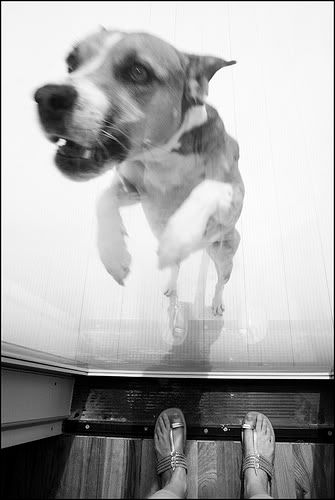 Has your dog training gone bad or is it simply due to a common training mistake?
Has your dog training gone bad or is it simply due to a common training mistake?
When it comes to animal training, one of the biggest errors people make is to think that once an animal is trained, that is it.
Done.
Finito.
Wrong!
Why? Because animal behavior and training maintenance is a lifestyle change not a one time process.
So, perhaps you’ve worked with a dog trainer, got good results, and then six months later are facing the same issues–and you give up.
Or worse, you say that your dog didn’t learn anything.
Sorry to break it to you but what the dog learned is that he or she does not have to adhere to the dog training rules because you gave up or got lazy!
Animals are great at manipulating behavior. They quickly find what works for them.
If it works well, it is reinforced or rewarded by the consequences.
So, if you “give in” to the dog’s demands, you are teaching the dog what to do in order to get that reward or desired outcome–but not the one you want.
Instead, what you are really doing is insuring that the dog gets the outcome he or she wants.
Let’s look at jumping on people as an example.
The behavior is pretty simple to extinguish but jumping is often reinforced by a variety of rewarding actions that can include:
- eye-contact plus laughter, smiling, or squealing,
- eye-contact plus yelling,
- eye-contact plus physical touch (pushing),
- greeting and petting,
- or physical removal of the dog by holding the paws and moving them someplace else.
Can you come up with any more?
Depending on the surroundings and your actions, you are probably reinforcing the behavior which is why it came back.
If the dog, for instance, was taught to sit instead of jumping on people. Does that get rewarded?
It might get missed, I’ve watched animals come up to their owners and sit for attention, only to be ignored or forgotten when the person comes in and gets busy with something else.
Or perhaps they are busy talking to someone in the room and the dog comes up and sits but is not rewarded for the behavior.
Chances are the dog will go back to what worked before.
That is why pawing and jumping work so well–people don’t tend to ignore it.
A well trained animal comes from good habits and a lifestyle change to maintain those habits.
It doesn’t mean you have to spend ages on training or maintaining a behavior but it does mean that you have to pay attention and make sure you are reinforcing the desirable behaviors and giving your animal quality time and attention.
Animals are living creatures but many people tend to prioritize their computer time or other activities around the house before they attend to the needs of their companion animal(s).
This is a great disservice to that animal in your home, it results in unruly or undesirable behavior from the pet, and also does not teach those in your sphere of influence how to be good stewards of animals or the earth–because those two things are connected.
If you spend a little bit of time maintaining good behavior by noticing it and reinforcing it instead of going back to old habits, you and your pet will be happier about life.
So, this week I want you to pay attention to how your dog is getting your attention and how you may have sabotaged your training progress with him or her.
If you are having problems, keep a log on what triggers the undesired (aka naughty) behavior you don’t want.
Then it will be easier to redirect the behavior into what you actually want.
Let me know if you have lapsed into this type of trouble or what you find out by logging your activities–just leave a note in the comments!

